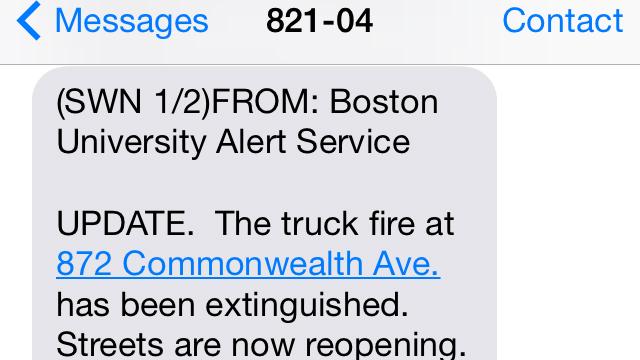A spill of the chemical hexane, a flammable solvent, in a chemistry laboratory at the Massachusetts Institute of Technology Tuesday caused quite a commotion on the Cambridge campus. The spill itself was minor. Nobody was injured, and although the building was evacuated, it was reopened shortly after. So why is the MIT community still talking about this blip? Apparently the MIT emergency alert, issued via text, e-mail, automated phone message and Twitter, was blown a little bit out of proportion for such a minor situation.
“MIT ALERT MIT is invest. report of a serious emergency on Campus. Emg personnel are responding. STAY ALERT,” the MIT Police Twitter account stated. They later accounted for their tweet with, “The @MITPolice rebroadcast MIT ALERTS via Twitter as they are received. We do not write the alerts and apologize for the confusion.”
The dramatic tone of this alert elicited a somewhat angry response from students who found out the alleged “serious emergency” was relatively inconsequential. And although most could agree having knowledge about a potential emergency is a positive, MIT’s campus is a little jaded toward campus alerts due to past experiences. In February 2013, the MIT alert system neglected to inform students of a gunman thought to be traipsing around campus until an hour had elapsed. The level of awareness around campus has increased in the months following the 2013 Boston Marathon bombings, when police chased Tamerlan and Dzhokhar Tsarnaev through their campus, resulting in the shooting and death of MIT Police Officer Sean Collier.
“Tensions are still high after the Marathon bombing and the shooting [of Collier], so it was worrisome to a lot of people,” Taylor Tracy, an MIT administrative assistant, said in a Wednesday Boston Globe article. “We live in a panic era, so people are just really quick to think the worst.”
It is understandable the students and faculty at MIT are still a little shaken up by the aftermath of the Marathon bombings. Those who were there are probably reminded of the fear of having two alleged terrorists running around campus and hearing gunshots from their dormitory windows.
Still, getting an exaggerated alert could be better than getting no alert at all. That is currently the controversy at Bridgewater State University, where administrators are receiving criticism for failing to send out a campus alert following two arrests for alleged rape, one on Sept. 3 and the other on Sept. 20. Although administrators maintained there was no threat to public safety, students were left feeling uninformed and untrusting of their university.
Under the federal Clery Act, colleges and universities are required to issue a timely warning with prevention information concerning crimes that present an ongoing threat to the campus community. However, a standard for “timeliness” is not specified, nor is a definition for what constitutes an ongoing threat.
College universities are notorious for blundering their handling of rape cases with the victims, perpetrators and campus community. Rape is a delicate situation. The sensitivity of the victim is sacrificed when a campus-wide blast goes out that someone was raped. Despite not being identified by name, the victim must still cope with his or her peers talking about it. Still, many college students would probably like to know any trends of rape on their campuses, and some sort of alert system for that could potentially increase awareness.
At Boston University, the BU Emergency Management and Response Team administers all campus alerts. According to their website, they only send these alerts during situations that place anyone within the BU campus at risk. BU claims to send these notifications only “after carefully assessing a situation and determining that it is serious enough to warrant universal notification.”
Ok, so BU has had its issues with alerts in the past. Sometimes students feel alerts are unnecessary, while other times students wish alerts had been sent. Sometimes they come a little late. On Friday, a truck caught fire on Commonwealth Avenue in West Campus around 10:30 a.m. and was subsequently extinguished at about 10:50 a.m. yet the BU Alert was not issued until 11:06 a.m., when the police and fire department were cleaning up the scene.
Nobody is perfect, but BU does a solid job of issuing informative alerts. Maybe they aren’t right on time, but BU does stick to its policy of providing as much knowledge of the emergency as they can gather while remaining timely, a strategy that prevents students from panicking about so-called emergencies before anyone knows how urgent they are.
When it comes to preserving campus safety, administrators should strive to be as informative as possible. Even if a little exaggerated, a maybe unnecessary alert for something that could be dangerous is better than no alert at all.


















































































































